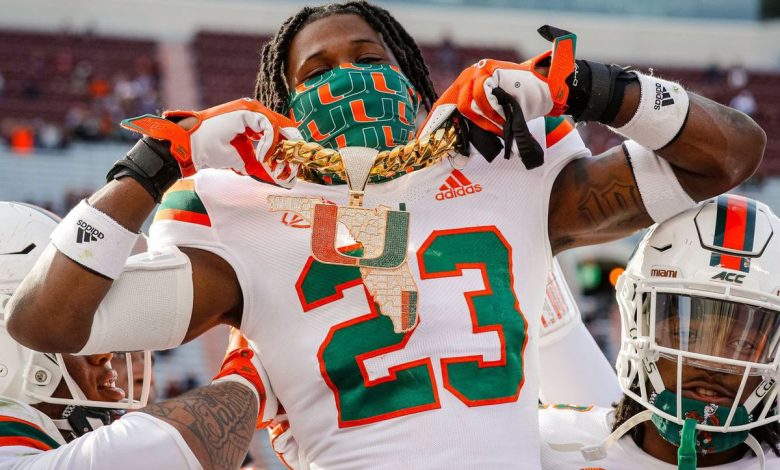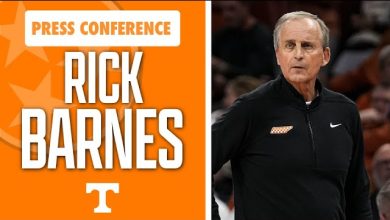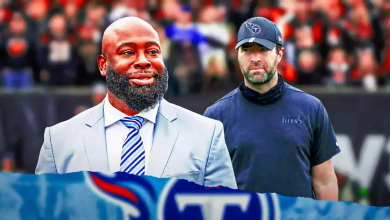Miami Hurricanes Football Continues Spring Practice with an Emphasis on Defensive Development

Miami Hurricanes Football Continues Spring Practice with an Emphasis on Defensive Development
As the Miami Hurricanes continue their spring football practices, all eyes are on the defense. Miami’s football program, historically known for its dominant defenses, is entering a crucial phase of development as they work to bounce back from a series of disappointing seasons. With a focus on rebuilding, the Hurricanes are using spring practices to refine their defensive strategies, develop young talent, and prepare for the challenges of the upcoming season.
The Miami Hurricanes football team has experienced its fair share of ups and downs in recent years. While the program boasts a rich history of championships, legendary players, and a reputation for producing elite defensive talent, recent seasons have been marred by inconsistent play and an inability to regain their former dominance. However, under the guidance of head coach Mario Cristobal and defensive coordinator Kevin Steele, the Hurricanes are focusing on regaining their defensive prowess. This spring, a heavy emphasis is being placed on defensive development to ensure that the team can compete at the highest level and challenge for titles in the near future.
The Legacy of Miami Hurricanes Defense
To understand the significance of this defensive development, it’s important to reflect on the legacy of Miami Hurricanes football. For decades, the Hurricanes were known for producing some of the most feared defenses in college football history. From the early 1980s to the early 2000s, Miami was synonymous with defensive excellence. The team’s “The U” culture, characterized by toughness, aggression, and relentless pursuit of the ball, made them a nightmare for opposing offenses.
Under coaches like Jimmy Johnson, Dennis Erickson, and Butch Davis, Miami’s defenses were known for their speed, physicality, and ability to create turnovers. Legendary players like Ray Lewis, Ed Reed, and Warren Sapp, among others, became synonymous with Miami’s defensive dominance. The Hurricanes consistently ranked among the best in the country in total defense, sacks, and interceptions. They were able to shut down opposing offenses with a combination of fierce pass rush, exceptional linebacker play, and an impenetrable secondary.
However, in recent years, the program has struggled to return to this level of defensive excellence. While Miami has produced individual talents, such as linebacker Shaquille Quarterman and cornerback Michael Jackson, the consistency and overall dominance of the defense have been lacking. Miami’s defense has struggled with allowing big plays, inconsistency in the pass rush, and an inability to create turnovers at the same level as they once did. The defense’s inability to step up in crucial moments has been one of the reasons why the team has failed to live up to expectations.
New Leadership: Mario Cristobal and Kevin Steele
With the hiring of Mario Cristobal as the head coach, Miami has undergone a cultural shift. Cristobal, known for his focus on physicality and discipline, has made it clear that building a strong defense will be one of his top priorities. He is committed to returning Miami to its roots by developing tough, aggressive defenses that can control games and set the tone.
To achieve this goal, Cristobal brought in Kevin Steele, a veteran defensive coordinator with a wealth of experience coaching in some of the best programs in college football. Steele has previously coached at programs like Auburn, Alabama, and LSU, and his defensive philosophies have consistently produced elite units. Known for his aggressive approach to defense, Steele is a perfect fit for a program looking to reestablish its identity on that side of the ball.
Steele’s defensive system emphasizes the importance of disciplined, aggressive play and is built around creating pressure up front. He has a reputation for getting the most out of his defensive linemen, linebackers, and defensive backs, making them formidable against both the run and the pass. Steele’s philosophy also emphasizes depth, as he believes in rotating players to keep them fresh throughout the course of a game and a season.
Under the leadership of Cristobal and Steele, Miami’s defense is expected to be more disciplined, aggressive, and relentless. They are working to install a scheme that can effectively neutralize high-powered offenses while giving the Hurricanes a chance to dominate games. The emphasis on defensive development during spring practice is an essential step in the program’s efforts to restore its identity as a defensive powerhouse.
Spring Practice: A Time for Development and Evaluation
Spring practice is a crucial period for college football teams, offering an opportunity to develop younger players, install new systems, and evaluate talent. For Miami, spring practices are the perfect time to experiment with different defensive schemes, evaluate the depth chart, and develop the next generation of playmakers.
One of the key areas of focus for Miami’s defense this spring is the defensive line. The Hurricanes have struggled with consistently generating pressure on opposing quarterbacks in recent seasons, and this has been a major area of emphasis for Steele and Cristobal. The defensive line’s ability to disrupt the quarterback is crucial to the success of any defense, and Miami has the talent to do so.
Miami has a talented group of defensive linemen, including players like Leonard Taylor and Jahfari Harvey, who have the potential to be dominant forces up front. Taylor, a five-star recruit, has flashed immense potential during his time at Miami, but he is still developing as a consistent playmaker. Harvey, on the other hand, is a dynamic pass rusher who can wreak havoc in opposing backfields. Both players will play a key role in Miami’s efforts to get back to playing the kind of defense that has made the program famous.
Alongside the defensive line, the linebacker position is another area that Miami is focusing on during spring practices. Linebackers have long been the backbone of Miami’s defenses, and the team is looking for players who can excel in both run defense and pass coverage. The Hurricanes have a solid group of linebackers, including players like Corey Flagg Jr. and Caleb Johnson, who will be looking to step up as leaders on the defense.
Flagg, a talented tackler and natural leader, is expected to be one of the focal points of Miami’s defense. He has the ability to read offenses, make plays in the backfield, and cover tight ends and running backs in pass coverage. Johnson, a young linebacker with a high ceiling, has shown flashes of brilliance in his early career and is looking to make a significant impact this spring.
The secondary, which has been a point of concern for Miami in recent years, is another area that the coaching staff is focusing on this spring. Miami has a talented group of cornerbacks and safeties, including players like Tyrique Stevenson and James Williams, who have the potential to be difference-makers in the defensive backfield. Stevenson, a transfer from Georgia, is known for his physicality and ball skills, while Williams, a highly-touted recruit, has the size and athleticism to be a shutdown safety.
Miami’s defense will need to be able to cover opposing receivers, prevent big plays, and create turnovers. Steele’s defensive philosophy places a premium on the ability of the secondary to play tight coverage, read the quarterback’s eyes, and force mistakes. During spring practice, the defensive backs are working on refining their skills and learning to execute the schemes that will allow them to be more effective in coverage.
Building Depth and Competition
One of the key aspects of Miami’s defensive development during spring practice is building depth across the unit. College football is a physically demanding sport, and a successful defense needs to be able to rotate players to maintain freshness and avoid injuries. Miami has been working hard to develop depth at every level of its defense, ensuring that they have capable backups who can step up when needed.
The competition for starting spots and significant playing time is fierce, with Miami’s coaching staff pushing players to elevate their performance. This healthy competition is essential for the development of the defense, as it forces players to continually push themselves and raise the level of their play. Players who may have previously been backups are getting opportunities to showcase their skills and earn more playing time, which will only make the defense stronger.
The Hurricanes are also focusing on recruiting and developing young talent to bolster their defense in the future. Miami has had success in recent years on the recruiting trail, bringing in highly-ranked prospects who can contribute immediately. The development of young players during spring practice is key to building a long-term foundation for success on defense.









